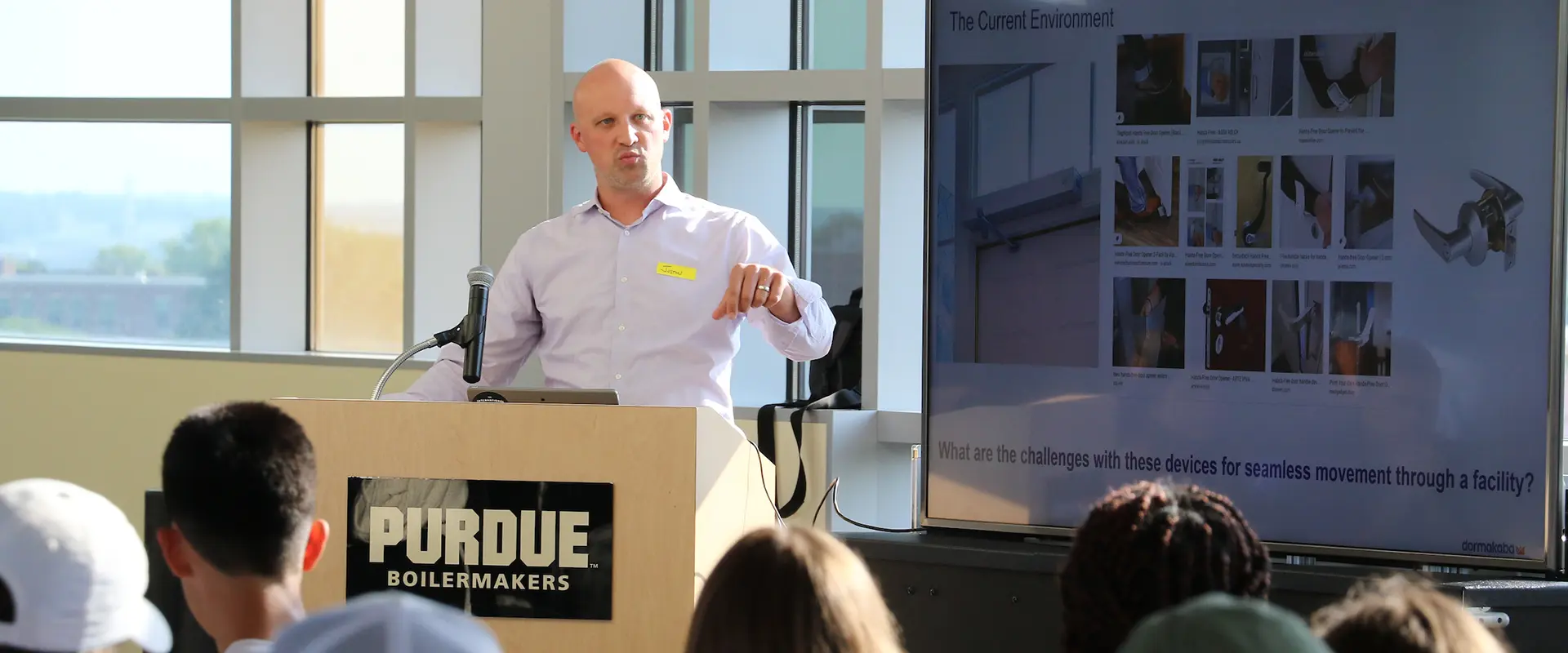
It’s no secret that students learn best when they can apply lessons from the classroom to real-world challenges. Indeed, transformative learning opportunities like corporate consulting projects are central to the mission of Purdue’s newly reimagined Mitchell E. Daniels, Jr. School of Business.

Among the school’s experiential learning offerings is a new course, Problem Solving in the Business World (MGMT 332), that guides students through a six-week product development project with company partners Whirlpool and dormakaba. The course is taught by alumnus Dave Randich, former president of MasterBrand Cabinets and a Daniels School lecturer in Law, Communication and Ethics.
“I wanted students to learn about product development from an inside-the-business perspective,” Randich says. “The goal was for them to use the same skills they would as future managers and to see themselves working in a professional setting.”
The partnerships were facilitated by Jess Franta, managing director of the Daniels School’s Business Partnerships Office. “We were looking for companies with a tangible product in mind and a willingness for creative thinking and innovation,” she says. “We also wanted companies that had been good partners in the past and would be exciting for the students to work with.”
Following ten weeks of classroom instruction, students in the course formed teams to work directly with their respective partner company to develop an idea for a new product. Their tasks included a market analysis and value proposition, an innovation overview, an operations and supply chain overview, and new product financial metrics. The teams met weekly with company representatives before presenting their ideas to management.
Logan Paul, a junior studying economics, was on a team that partnered with Whirlpool’s Kitchen-Aid consumer appliance division. “This course taught me everything that goes into creating a new product and presenting it in a professional setting, from product ideation to production and packaging,” he says. “My biggest takeaways were the lessons it taught me about problem solving and working in a group.”
Hannah Baird, Whirlpool’s facilitator for the course, says the students asked insightful questions and approached the case study with excitement and fresh perspectives.
“I was impressed by their willingness to think outside of the box of what we currently offer and start with the end consumer in mind,” she says. “Also, their attention to detail with every section we touched on was visible throughout their final presentations. They really took the time to apply what we went through to give some top-notch recommendations.”
Justin Crotzer, a Purdue engineering alumnus and senior vice president of product development at dormakaba, led his company’s involvement in the course.
“The course provided a clear demonstration of Purdue’s investment in essential real-life business planning, strategic thinking and presentation professionalism,” Crotzer says. “The Daniels School is taking active steps to ensure their students join the workforce prepared with a working knowledge of business vocabulary and business plan development.”
Alex Housten, president of dormakaba, came away from the course equally enthused. “The Purdue MGMT 332 students brought energy, innovation and fresh eyes to our business, enabling a renewed approach to success in this market,” he says. “Dave Randich guided a structured and paced process that added real value to dormakaba.”
In addition to providing Whirlpool and dormakaba with new product ideas, the course allowed the companies to create a pipeline of future talent.
“They spent a lot of time selling their companies to the students,” Randich says. “It was a great opportunity for students to integrate and interact with the company and put themselves in a position for internships or full-time employment.”
Whirlpool’s Laird agrees. “Course partnerships are probably one of the best strategies we can leverage to start scouting top talent early on,” she says. “Working with classes offers an opportunity to be first in those students' minds when they think of companies they may aspire to work for one day.”
The course, which aligns with Purdue’s Transformative Education 2.0 initiative, is also an example of how the Daniels School is integrating experiential learning and innovative company engagement across the curriculum. By switching the learning experience from passive to active, the school produces agile, critical thinkers capable of identifying and solving the world’s biggest problems.
“What's been most important is building a strong match between what students are looking for, what their academic and professional goals are and allowing them to transfer that into the working world through academic projects,” says Franta. “It all begins with an initial conversation about the business challenge that we're hoping to solve and how Purdue and the business school can make that happen.”